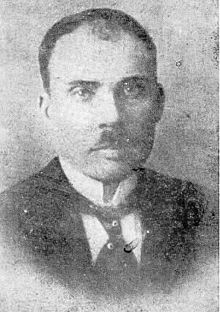Vasil Sakarka
Wassil Sacharka ( Belarusian Васіль Захарка ; born April 1, 1877 in Dabraselzy, today Selva district ; † March 14, 1943 in Prague ) was a Belarusian politician. From 1928 to 1943 he was President of the Rada BNR , the government-in-exile of the Belarusian People's Republic .
Life
Sacharka was born into a poor farming family and was orphaned at the age of 16. From 1895 to 1898 he worked as a teacher in schools run by the Orthodox Church. In 1898 Zecharka was drafted into the army and remained in the military until 1917. After the February Revolution in 1917 , he founded Belarusian military units and in the summer of the same year initiated the organization of a congress of Belarusian soldiers' delegates, which elected Zecharka as secretary of the Belarusian Central Military Council on October 22, 1917 . At that time he was one of the leaders of the Belarusian Socialist Hramada . At the 1st Belarusian People's Congress in December 1917, Sakarka was elected to the Rada BNR, the government of the Belarusian People's Republic. In February 1918 he became one of the leaders of the People's Secretariat of Belarus, which was appointed by the Executive Committee of the 1st Belarusian People's Congress and recognized by Germany as the representative of the Belarusian people. As a result of the declaration of independence of the Belarusian People's Republic, Sakarka took over various posts in ministries and diplomatic institutions.
He initiated, along with others, the holding of the First Belarusian National and Political Conference, which was held in Prague in September 1921 and at which the Treaty of Riga was viewed as the occupation of Belarus by two states. Sacharka worked as finance minister in the government-in-exile of the Rada BNR, which at that time had its seat in Kaunas . At the Second Belarusian Conference, which was held in Berlin in October 1925 , Sakarka was one of the few politicians in exile who refused to recognize the government of the Belarusian Soviet Socialist Republic as a representative of the Belarusian nation. Sacharka did not return to Belarus, but stayed in Prague. After the death of Pyotra Kratscheuski , Sacharka took over the office of President of the Rada BNR in March 1928. He wrote letters to the League of Nations to protest the persecution of the Belarusian people. On April 20, 1939, Sacharka sent a 17-page memorandum, written together with Ivan Yermachenka , to Adolf Hitler , in which he was asked to take the interests of the Belarusian people into account in future developments . On August 3, 1939, Sacharka and Yermatschenka were summoned to the German Foreign Ministry, where the chairman of the Eastern Department of the Ministry, Professor Mayer, told them that Germany was against a unified, indivisible Russia, but that he could not make any concrete promises. On June 28, 1941, Sacharka telegraphed Hitler wishing him a quick and decisive victory over the Jewish-Bolshevik regime on all fronts . Sacharka died on March 14, 1943 in Prague.
Individual evidence
- ^ A b c Wojciech Roszkowski , Jan Kofman (Ed.): Biographical Dictionary of Central and Eastern Europe in the Twentieth Century. Routledge, Abingdon et al. 2015, ISBN 978-0-7656-1027-0 , p. 1138.
- ^ Leonid Rein: The kings and the pawns. Collaboration in Byelorussia during World War II. Berghahn Books, New York 2011, ISBN 9780857450432 , p. 96.
- ^ John-Paul Himka, Joanna Beata Michlic : Bringing the Dark Past to Light: The Reception of the Holocaust in Postcommunist Europe. U of Nebraska Press, 2013, ISBN 9780803246478 , p. 66
| personal data | |
|---|---|
| SURNAME | Sacharka, Wassil |
| ALTERNATIVE NAMES | Захарка, Васіль (Belarusian) |
| BRIEF DESCRIPTION | Belarusian politician |
| DATE OF BIRTH | April 1, 1877 |
| PLACE OF BIRTH | Dabraselzy, today Selwa Rajon |
| DATE OF DEATH | March 14, 1943 |
| Place of death | Prague |


